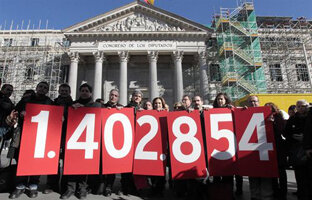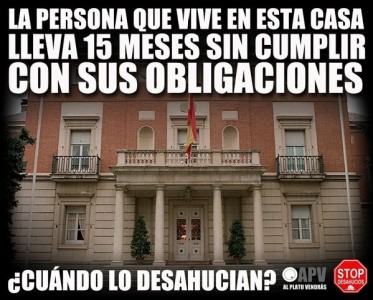[All links are in Spanish unless otherwise noted]
This article is part of our special news coverage Europe in Crisis [1].
“We have wrestled out an important victory today. Social media has been ablaze in recent days leaving one thing for certain: the victory is ours and ours alone.” A Plataforma de Afectados por la Hipoteca (PAH) [2] spokesperson said these words recently in Barcelona to crowds gathered in front of the Popular Party's (PP-the governing party) headquarters in Madrid. For years, the PAH [Platform of People Affected by Mortgages] has lead a public effort [3] in the fight against mortgage-based evictions in Spain.
To the surprise of many, minutes before the vote the Congressional majority announced it would not block the Popular Legislative Initiative (ILP) [4] proposed by the PAH, which sought to modify the legislation regarding Spanish mortgages. The annoucement was met by a resounding “Yes we can!” from PAH supporters on the ground, on social media networks and in Madrid's Congressional hall, from where a few members of the PAH were expelled.
In the end, the vote was nearly unanimous with 333 voting in favor of the ILP. Only one, from the PP, abstained. The bill (which mandates that the property be the repayment of the debt in full, that bank owned homes be used for public housing, and suspends evictions) garnered nearly 1.5 million signatures in support in a petition that circulated Spanish territory.

The number of signatures collected in support of the new law. Photo taken by @tomstomkitrur.
Members of the PP, who hold an absolute majority, had previously announced their intent to block the bill while the minority parliamentary groups expressed their support. This Storify post [5] chronicles their opinions expressed on Twitter, collected by the citizen platform Qué hacen los diputados [6] [What Parliament should do].
The PP finally backed down after enormous public pressure and PAH's creative campaign [7], #ILPescrache, inspired by the Argentine protests [8] and launched last Sunday. Also, recently, a retired couple from Mallorca committed suicide [9] after learning they would lose their home. While the numbers are not clear, the PAH estimates that more than one third [10] of Spain's suicides are linked to evictions.
The #ILPescrache campaign utilized all available resources in requesting PP members to move beyond party lines and vote in support of the ILP. Citizens contacted representatives through Twitter (made available here [11]) and Facebook accounts, via email, or by telephone. The hashtags #ILPoALaCalle, #ILPesDemocracia, #PPcriminales, and #ImPAHrables became Trending Topics in Spain.
The website Querido diputado no desahuciado [12] [Dear Non-evicted member of Parliament] automatically sent tweets to parliamentarians asking: “Will you vote for the ILP or do you prefer to perpetuate evictions?” Another campaign, Oiga.me [13], sent mass email messages. According to the group's numbers, in two days more than 7,000 people sent nearly one million messages to PP members. In this Pastebin [14] are a list of the campaigns in support of ILP.
Here is one of the photos of the Moncloa, the government's presidential headquarters, that has been widely circulated:

“The person who lives in this house has not fulfilled his obligations in 15 months. When will he be evicted?” Photo by @elpadrecorajede.
Campaigns in support of the approval of the ILP start this Saturday in 46 different cities [15] across the country under the slogan “for the right to a home and the fight against financial genocide.”
The PAH has won the first battle, but has yet to overcome the entire parliamentary process.
This article is part of our special news coverage Europe in Crisis [1].